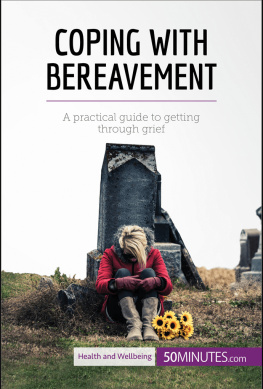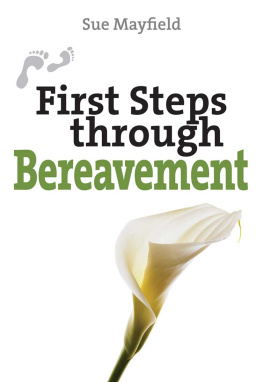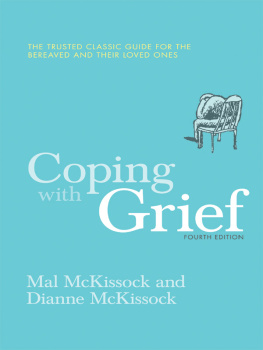50Minutes.com - Coping With Bereavement
Here you can read online 50Minutes.com - Coping With Bereavement full text of the book (entire story) in english for free. Download pdf and epub, get meaning, cover and reviews about this ebook. year: 2017, publisher: 50Minutes.com, genre: Religion. Description of the work, (preface) as well as reviews are available. Best literature library LitArk.com created for fans of good reading and offers a wide selection of genres:
Romance novel
Science fiction
Adventure
Detective
Science
History
Home and family
Prose
Art
Politics
Computer
Non-fiction
Religion
Business
Children
Humor
Choose a favorite category and find really read worthwhile books. Enjoy immersion in the world of imagination, feel the emotions of the characters or learn something new for yourself, make an fascinating discovery.
- Book:Coping With Bereavement
- Author:
- Publisher:50Minutes.com
- Genre:
- Year:2017
- Rating:3 / 5
- Favourites:Add to favourites
- Your mark:
- 60
- 1
- 2
- 3
- 4
- 5
Coping With Bereavement: summary, description and annotation
We offer to read an annotation, description, summary or preface (depends on what the author of the book "Coping With Bereavement" wrote himself). If you haven't found the necessary information about the book — write in the comments, we will try to find it.
Coping With Bereavement — read online for free the complete book (whole text) full work
Below is the text of the book, divided by pages. System saving the place of the last page read, allows you to conveniently read the book "Coping With Bereavement" online for free, without having to search again every time where you left off. Put a bookmark, and you can go to the page where you finished reading at any time.
Font size:
Interval:
Bookmark:
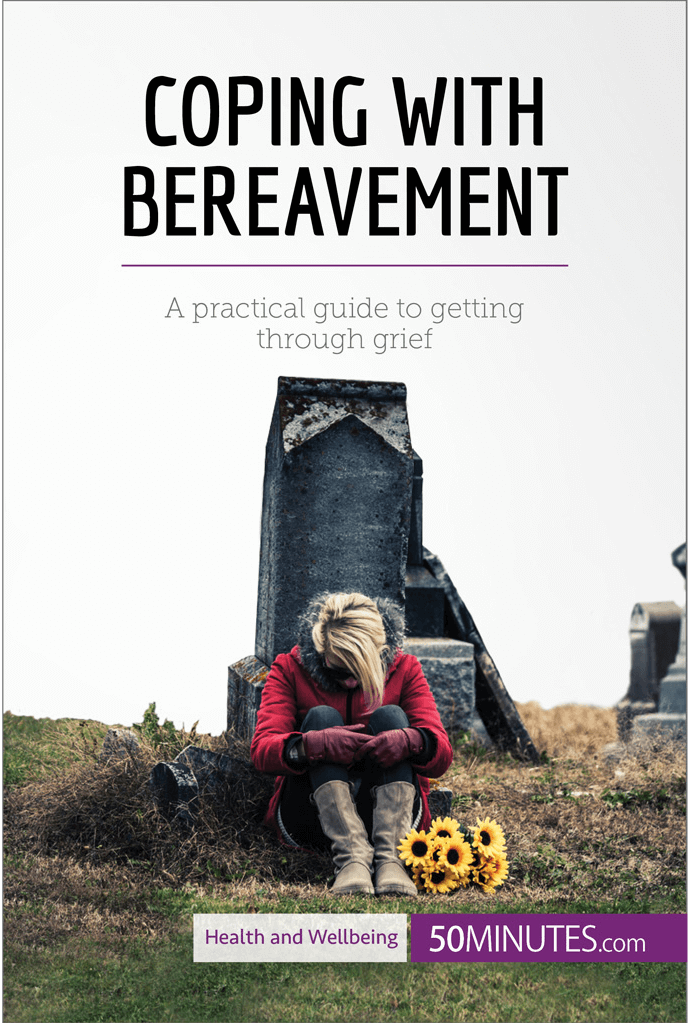
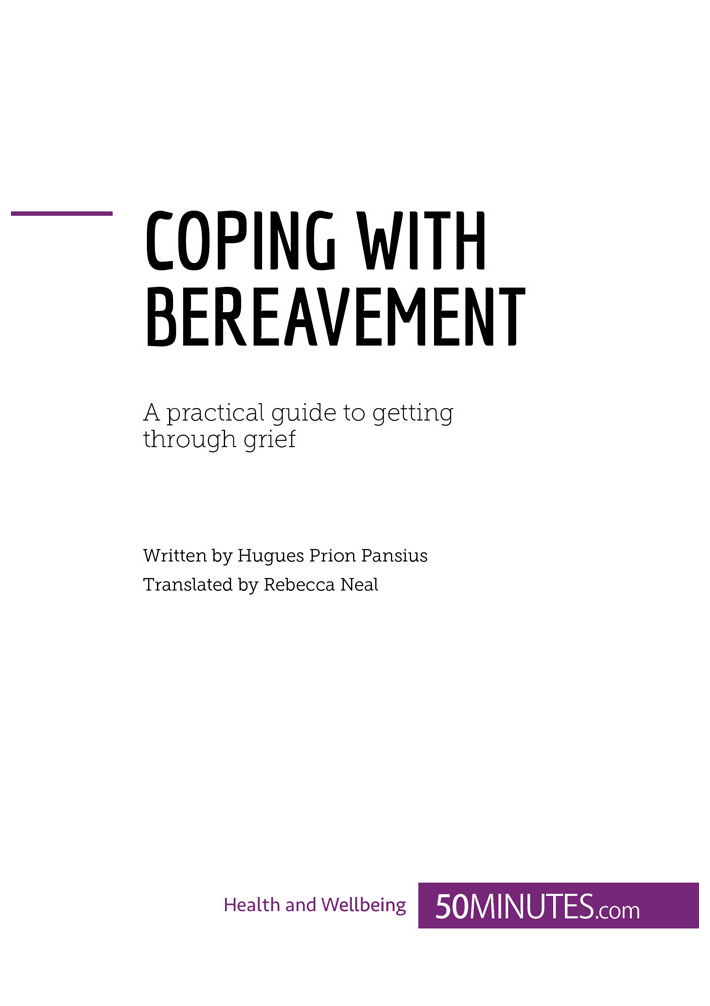

- Problem: we will all lose a loved one at some point in our lives, and this experience is very painful and difficult to deal with. Whether sudden or not, the absence of a loved one disrupts our day-to-day activities and upsets the balance of our lives. Learning to live with this constant empty space can then seem impossible. How can you respect your grief while still moving forward to rediscover your taste for life? How can you survive bereavement without sinking into despair?
- Aim: to understand and overcome your grief.
- FAQs:
- Is grief work necessary?
- How long does grief last for?
- Is it normal to cry all the time?
- Will the pain go away more quickly if I ignore it?
- I am smiling again and I have new plans. Should I feel guilty?
Although death comes to us all, it is still a taboo subject in Western society and the idea of it terrifies us. Even hearing it mentioned makes us uncomfortable. What, then, can we say about the death of a loved one, which for many people is a traumatic experience and can seem impossible to move on from? How can we survive the immense pain caused by the loss of a parent, partner, child or friend? Inevitably, all of us have lived through, are currently living through or will live through this difficult experience at some point and will spend a long, painful period mourning. The different phases of grief, including shock, anger, denial, guilt and depression, stir up a whole host of emotions, which are undeniably painful but which are nonetheless necessary if we are to accept the harsh reality.
I was 24 when my mother died of cancer. It was a huge shock for me and I felt as though I had fallen into a bottomless pit. For a long time, I felt disconnected from reality: nothing mattered to me any more and my life seemed to have no meaning. I was completely numb. Rather than accepting this unbearable reality, I tried to run from it and lived in a fools paradise. I started to get better the day a wise person told me that my mother had never left me and that she was living in me. (Christian, 45)
In 50 minutes, you will understand the mechanisms that start working after bereavement, the practical side of these mechanisms, the importance of being supported by those around you, and some personal approaches you can take to help you in your journey towards acceptance. Finally, you will learn to identify the positive attitudes to adopt and the clichs to avoid when you want to support a loved one who is going through grief or explain death to a child.
Bereavement, which comes from the Old English bereafian , meaning to deprive of, take away by violence, seize, rob, refers to the period of distress and sadness following the death of a loved one. For us to be bereaved, we must have had a particular attachment to the person who has passed away. Otherwise, we would constantly be bereaved! The psychiatrist and psychotherapist Christophe Faur also specifies that the intensity of bereavement is not determined by blood ties, but by how attached we were to the person. He further explains that bereavement can sometimes become a problem (although this is rare), for example if the bereaved person has a history of depression or if they had a conflictual relationship with the dead person. In this last case, they may develop a profound feeling of guilt, as they may feel that they unconsciously wished the persons death on them.
Freud and grief work
In his 1917 essay Mourning and Melancholia, Sigmund Freud became the first person to develop the concept of grief work. He claimed that this expression results from the loss of a loved one, and also from the loss of an object we are attached to. Grief work can therefore be defined as a long intrapsychic process resulting from the loss of an object a person is attached to. Through grief work, the person gradually manages to detach themselves from the object.
While bereavement affects us all irrespective of gender, age or ethnicity, each culture has its own rituals and ways of dealing with the death of a loved one. For example, while the expression of grief is accepted and even encouraged in Western and African culture, it is viewed less positively in Asian and Muslim culture. In Asian society, emotions are expected to be kept private, while Muslims believe that containing grief shows that a person has accepted Gods decision. As well as funeral rites and the expression of grief, each religion has very specific mourning periods and a different approach to funerals. For Buddhists, who believe in reincarnation, mourning lasts for 49 days, and at the end of this period a prayer is recited to help the dead person to be reincarnated. In Hinduism, the family of the dead person must lead a moderate lifestyle (no meat, alcohol, jewellery or make-up) during the mourning period, which lasts for 13 days and ends with a ceremony organised at the home of the dead person. The mourning period for Muslims is 40 days, during which the friends and family of the dead person must behave and dress soberly. At the end of this period, prayers are recited to help the dead person to ascend to heaven. In Judaism, there are five phases of mourning: Aninut , the period between death and the funeral; Avelut , the first seven days after the burial; Sheloshim , the first 30 days after the burial; Yud Bet Chodesh , the first 12 months following the burial; and Yahrzeit , the anniversary of the death.
Did you know?
In China, there are five circles of mourning. The first circle comprises the most important family members, namely the parents and the spouse, while the last circle is made up of less important family members, as well as the couples children. For the Chinese, the death of a child is a source of shame, so they never attend their funeral.
When you are stricken by grief following the death of a loved one, your life will be made even more difficult by a number of administrative and financial formalities, which will stop you from beginning your grief work. Although these tasks allow some people to take their minds off the pain they are feeling, for others they can become a burden that is too heavy to bear. Do not be afraid to ask the people around you for help if you do not feel strong enough to deal with these tasks.
During our lifetimes, we take out various insurance policies; we have bank accounts; we are registered with a healthcare provider and with the local authorities; we pay service providers every month, and so on. When we die, our family must notify all these people and organisations in order to stop these services and close our accounts. While some tasks can be carried out several weeks after the death, others must be done immediately.
To help you, here is a list of administrative formalities, in order of priority:
- Register the death. Unless your loved one died in a hospital or an official establishment (care home, prison, psychiatric institution), you must call a doctor to legally register the death of your loved one, so that you can declare it to the local authorities.
- Contact a funeral home. This company will take care of organising the funeral service, and will also declare the death to the local authorities, which must be done within five days.
Font size:
Interval:
Bookmark:
Similar books «Coping With Bereavement»
Look at similar books to Coping With Bereavement. We have selected literature similar in name and meaning in the hope of providing readers with more options to find new, interesting, not yet read works.
Discussion, reviews of the book Coping With Bereavement and just readers' own opinions. Leave your comments, write what you think about the work, its meaning or the main characters. Specify what exactly you liked and what you didn't like, and why you think so.

